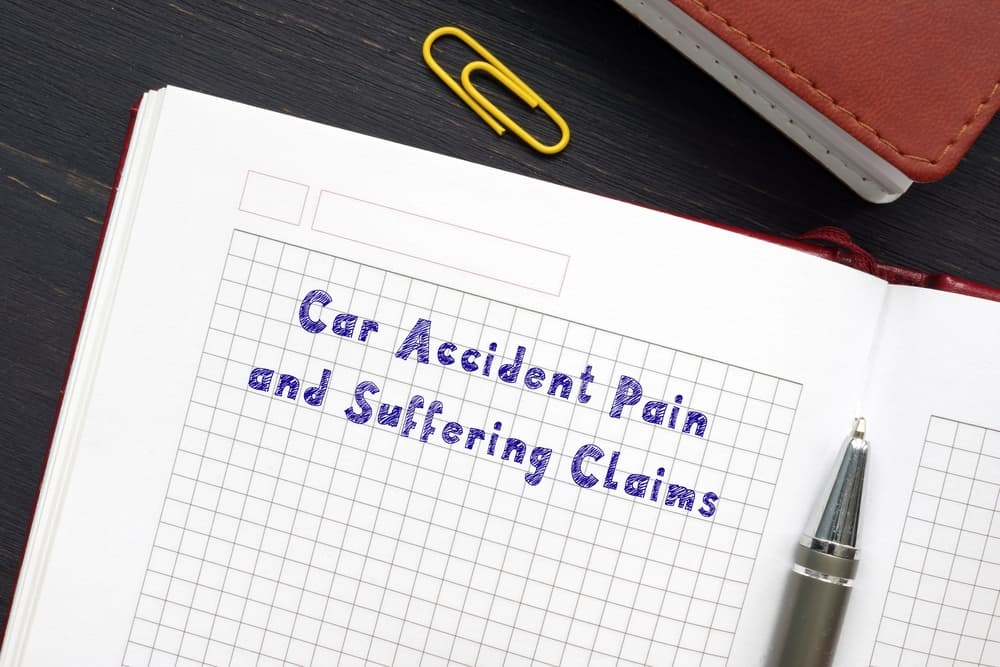If you’ve been in a car accident, you may be wondering how much compensation you can receive for your pain and suffering. Pain and suffering is a legal term that refers to the physical and emotional stress caused by an injury. It can include things like physical pain, emotional distress, loss of enjoyment of life, and inconvenience.
In most cases, pain and suffering are considered non-economic damage. This means it doesn’t have a specific dollar amount, such as lost income or medical expenses. Rather, the compensation you receive for pain and suffering will depend on the severity of your injuries and how much they have impacted your life. Always have a car accident attorney calculate your pain and suffering.
Factors That Affect Pain and Suffering Compensation

Several factors can affect the amount of compensation you receive for pain and suffering after a car accident.
These include:
The Severity of Your Injuries
The severity of your injuries is one of the most significant factors impacting your compensation for pain and suffering. Generally, the more severe your injuries are, the more compensation you will be entitled to. This is because severe injuries often result in greater physical pain, emotional distress, and overall disruption to your life.
For example, if you suffered a broken bone or required surgery after a car accident, you may be entitled to a higher amount of compensation than if you only sustained minor cuts and bruises.
Broken bones and surgical procedures often involve serious pain and lengthy recovery times and may even result in permanent scarring or disfigurement. These types of injuries can also impact your ability to work and participate in daily activities, leading to additional emotional distress and financial losses.
In contrast, minor injuries like cuts, bruises, or whiplash may heal relatively quickly and lessen the impact on overall quality of life. While these injuries can still be painful and disruptive, they generally don’t warrant as much compensation for pain and suffering as more severe injuries.
The severity of your injuries may not always be immediately apparent after an accident. Some injuries, such as whiplash or concussions, may not show symptoms until days or even weeks later.
This is why it’s wise to seek medical attention as soon as possible after a car accident, even if you don’t think you’ve suffered a severe injury. A medical professional can properly diagnose your injuries and provide documentation of their severity, which is essential evidence in your claim for pain and suffering damages.
The Length of Your Recovery
The length of your recovery period is another factor affecting the compensation you receive for pain and suffering. Generally, the longer you recover from your injuries, the more compensation you may receive. This is because a long recovery period often involves more physical pain, emotional distress, and overall inconvenience than a shorter recovery period.
For example, if you suffered a spinal cord injury that requires months of physical therapy and rehabilitation, you may be entitled to more compensation than if you sustained a minor ankle sprain that heals within a few weeks.
Serious injuries often require extended time off work, leading to lost income and financial strain. They may also involve ongoing medical treatment, such as follow-up surgeries or pain management, which can be costly and time-consuming.
In addition to the physical pain and discomfort, a lengthy recovery period can also take a significant toll on your mental health. Being incapable of working, engaging in hobbies or social activities, or caring for your family can lead to feelings of depression, anxiety, and isolation. These emotional challenges are a very real part of the overall pain and suffering you may experience after a serious car accident.
When evaluating your claim for pain and suffering damages, insurance companies and juries will consider the total length of your recovery period and any long-term or permanent limitations you may face.
Work closely with your medical providers to document your recovery process and any ongoing challenges you may face. This evidence will help demonstrate your pain and suffering and justify a higher compensation award.
The Impact on Your Daily Life
The impact of your injuries on your daily life is another significant factor affecting the compensation you receive for pain and suffering.
If your injuries substantially disrupt your ability to work, enjoy hobbies, or care for your family, you may be entitled to more compensation. These activities are essential to your overall well-being and quality of life, and their loss can cause significant emotional distress and hardship.
For example, if you sustained a traumatic brain injury that affects your cognitive abilities and prevents you from returning to your previous job, you may be entitled to substantial compensation for the loss of your career and the emotional toll when you cannot provide for your family.
Similarly, if your injuries prevent you from participating in hobbies or social activities that were once a source of joy and fulfillment, you may be compensated for losing these experiences.
In addition to directly impacting your own life, your injuries may also affect your relationships with family members and loved ones. If you require extensive care or assistance with daily tasks, your spouse or children may have to take on additional responsibilities or make sacrifices in their own lives. This can lead to strain on your relationships and further compound the emotional distress caused by your injuries.
When evaluating your claim for pain and suffering damages, consider how your injuries have impacted your daily life. This may include keeping a journal or log of your experiences and gathering statements from family members, friends, or co-workers who have witnessed the challenges you face.
An experienced car accident attorney can document the full impact of your injuries and build a strong case for maximum compensation.
Your Age and Overall Health
Your age and overall health at the time of the accident can also play a role in the amount of compensation you receive for pain and suffering. This is because older individuals and those with pre-existing health conditions may face additional challenges and longer recovery times after an injury.
For example, if you are an older adult with osteoporosis who sustains a broken hip in a car accident, you may require more extensive medical treatment and a longer rehabilitation period than a younger, healthier individual with the same injury. Your age and pre-existing condition can make the injury more severe and the recovery process more difficult, leading to increased pain and suffering.
Similarly, if you have a chronic health condition like diabetes or heart disease, an injury from a car accident may exacerbate your symptoms or lead to additional complications. This can prolong your recovery time and lead to more significant physical and emotional challenges.
In addition to the physical impact, your age, and overall health can also affect your emotional well-being after an accident. Older adults may face greater anxiety and fear about their ability to recover and maintain their independence. At the same time, those with pre-existing health conditions may worry about the long-term impact on their overall prognosis.
When evaluating your claim for pain and suffering damages, insurance companies and juries will consider your age and overall health in the context of your specific injuries and circumstances.
Work with your medical providers to document any pre-existing conditions and how they may have affected your recovery process. An experienced car accident attorney can help you present this evidence persuasively.
Seeking the Help of a Car Accident Lawyer
The process of seeking compensation for pain and suffering after a car accident can be overwhelming, especially when you are also dealing with physical injuries and emotional trauma. This is where the help of an experienced car accident lawyer can be beneficial.
A skilled car accident attorney can help you understand your rights and options for seeking compensation and gather the necessary evidence to support your claim. They can also work with medical professionals and other professionals to document the severity of your injuries, the length of your recovery, and the impact on your daily life.
They can also negotiate with insurance companies on your behalf to ensure you receive a fair settlement that fully compensates you for your pain and suffering.
Car accident lawyers can provide much-needed emotional support and guidance during a difficult time. They can help alleviate the stress and uncertainty of the legal process, allowing you to focus on your physical and emotional recovery.
If you or a loved one has suffered an injury in a car accident, don’t wait another day to seek the help of a qualified car accident lawyer. Many attorneys offer free initial consultations and work on a contingency fee basis, meaning you won’t owe any legal fees unless they successfully recover compensation on your behalf.
Calculating Pain and Suffering Damages

So, how do insurance companies and courts calculate pain and suffering damages? There are a few common methods:
The Multiplier Method
This method multiplies your economic damages (such as medical bills and lost income) by a number between 1.5 and five, depending on the severity of your injuries. For example, if your economic damages are $10,000 and your injuries are moderately severe, the insurance company may multiply that amount by three to receive a pain and suffering award of $30,000.
The Per Diem Method
This method assigns a dollar amount to each day you experience pain and suffering from your injuries. For example, the insurance company may determine that $200 per day is reasonable for your pain and suffering. If you experience pain and suffering for 100 days, your total award will be $20,000.
The Hybrid Method
Some insurance companies and courts combine the multiplier and per diem methods to calculate pain and suffering damages. For instance, they may use the per diem method for a certain period (such as the first 90 days after the accident) and then switch to the multiplier method for ongoing pain and suffering.
These methods are just a starting point for negotiations. The actual amount of compensation you receive for pain and suffering will depend on the specific facts of your case and the strength of your evidence.
Proving Pain and Suffering Damages

To recover compensation for pain and suffering, you must provide evidence of your injuries’ physical and emotional impact.
Some common types of evidence include:
- Medical records: Your medical records can help establish the severity of your injuries and the treatment you received. Keep copies of all doctor’s notes, test results, and treatment plans.
- Photos and videos: Photos and videos of your injuries can be powerful evidence of the physical pain and suffering you experienced. Be sure to take photos of your injuries at various stages of healing, as well as any visible scars or disfigurement.
- Journal entries: Keeping a daily journal of your pain levels, emotional state, and physical limitations can help paint a picture of the overall impact of your injuries on your life. Be as detailed as possible in your entries.
- Witness statements: Statements from family members, friends, or co-workers who have witnessed the impact of your injuries on your daily life can also be valuable evidence. For example, a spouse can testify about your inability to perform household chores or engage in recreational activities you once enjoyed.
- Professional testimony: In some cases, you may need to hire expert witnesses to testify about the severity of your injuries or their long-term impact on your life. These professionals may include medical professionals, vocational specialists, or mental health providers.
The Role of a Car Accident Lawyer
While it’s possible to negotiate a pain and suffering settlement on your own, it’s usually in your best interest to work with an experienced car accident lawyer. A skilled car accident attorney can gather the necessary evidence to support your claim, negotiate with the insurance company on your behalf, and fight for the maximum compensation you deserve.
Your lawyer can also assist in avoiding common mistakes that can hurt your case, such as giving a recorded statement to the insurance company or accepting a lowball settlement offer. They can also advise you on the potential value of your claim based on their experience with similar cases in your area.
When meeting with a car accident lawyer for the first time, bring any relevant documents, such as police reports, medical records, and insurance information. Be prepared to answer questions about the accident, your injuries, and their impact on your life.
Most car accident lawyers offer free initial consultations, so don’t hesitate to shop around until you find an attorney you feel comfortable with.
Call a Car Accident Lawyer Today

If you or a loved one has suffered an injury in a car accident, speak with a car accident attorney ASAP. A knowledgeable attorney can help evaluate your case, gather evidence to support your claim and negotiate with the insurance company to ensure you receive fair compensation for your pain, suffering, and other damages.
Don’t wait to get the legal support you need. Contact a Dunwoody personal injury lawyer today to discuss your case and learn more about your rights and options.
